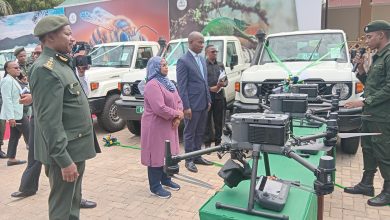NIMCA’S JOURNEY: From Cape Town to Arusha

TANZANIA: ON 23rd May 2024, in the scenic coastal city of Cape Town, South Africa, a defining chapter in Africa’s media history silently unfolded.
What began as a routine Africa Media Councils Conference evolved into something far more transformative and impactful: The establishment of the Network of Independent Media Councils of Africa (NIMCA).
NIMCA is not a mere network of journalists and broadcasters on the continent. It is Africa’s unified response to the demand for credible, independent, and ethical journalism.
It is an ambitious platform intentionally designed to safeguard media and journalists freedoms, enforce ethical standards, and reinforce democratic values across the African continent.
Now, just one year later, that journey advanced to its next historic moment: the NIMCA Summit 2025, hosted from 14th to 17th July in Arusha, Tanzania, at the worldrenowned Arusha International Conference Centre (AICC).
NIMCA’s Birthplace: Cape Town, May 2024
Cape Town served as the birthplace of NIMCA’s vision. It was a historical gathering point for Africa’s media council leaders, ombudspersons, civil society actors, private sector and development partners. Here, after rigorous deliberations, Africa’s independent media regulators committed to forging a continental body to unify and strengthen their efforts.
In a powerful display of trust and continental solidarity, Mr Ernest Samson Sungura the Executive Director Media Council of Tanzania (MCT) was elected to the historical inaugural Chairperson of NIMCA’s Governing Council. With over three decades in media governance and press freedom advocacy, Mr Sungura became the face of this transformative movement.
Crafting the vision
One of his very first assignments was coming up with a mobilisation and sustainability strategy to take NIMCA to Africa and later to the world. He started by establishing an allembracing Technical Team to guide such key operations of the network. One of the other cardinal roles that was enlisted for NIMCA’s Technical Team was to ensure a successful and structured transition.
The inaugural NIMCA board successfully endorsed the NIMCA Technical Advisory Team on 18th September 2024 at the UNESCO Commission of Tanzania offices in Dar es Salaam.
The team is composed of accomplished media and development experts, experienced journalists, institutional strategists, a citizen scientist and seasoned capacity building experts.
Under his stewardship, the technical team has provided policy direction, institutional architecture, and technical guidance, spearheading NIMCA’s evolution from concept to operational entity.
Most notably, the technical team has overseen the rebranding of the Africa Media Councils annual gathering into the Pan-African Media Councils Summit, now widely recognized as the NIMCA Summit, established operational policies and standards, designed a five year strategy (2025/2030), a NIMCA Sustainability Road Map, to mention but a few.
NIMCA’s Core Objectives
Strengthening Independent Media Regulation, Promoting self-regulation and ethical accountability across national borders, enhancing press freedom and responsibility, a and defending the media’s right to operate freely, while fostering responsible journalism.
Other objectives include fostering Pan-African Collaboration, creating mechanisms for peer learning, joint initiatives, and cross-country solidarity, combating misinformation and digital threats, and developing strategies to address online harms, hate speech, and misinformation.
ALSO READ: Dr. Biteko calls on the Media to observe ethics heading to the General Elections
Also in the list of objectives include capacity building and research and supporting councils with technical training, data tools, and evidencebased research.
Leadership and Structure
NIMCA is governed by a distinguished board reflecting regional diversity: It has a chairperson, vice chairperson, members from Tanzania, South Africa, Ghana, Zambia and Kenya. The NIMCA leadership also include the technical team.
Its membership spans national media councils, ombudsperson offices, and other independent media accountability mechanisms.
NIMCA’s growth has been made possible through support from influential partners including: African Union, EAC. SADC,UNESCO,African Union Commission DPA,Ford Foundation, Open Society Foundations, Konrad-Adenauer-Stiftung (KAS), Internews, East African Legislative Assembly (EALA), Southern African Editors Forum (SAEF) and Glow Consulting Services. These institutions have not only funded NIMCA’s foundational work but continue to provide technical and strategic support for its continental programmes.
A New Dawn for African Media
From the historic heights of Table Mountain to the diplomatic heart of Arusha, NIMCA’s journey is symbolic of Africa’s rise—bold, unified, and forward-looking.
NIMCA is a movement of Africa that recognizes that the strength of democracy lies not only in free expression—but in ethical, responsible, and accountable journalism. As Africa navigates complex social, political, and digital challenges, NIMCA stands as a continental lighthouse.
As the world watches, Africa is charting its own course. And NIMCA is steering the helm.





